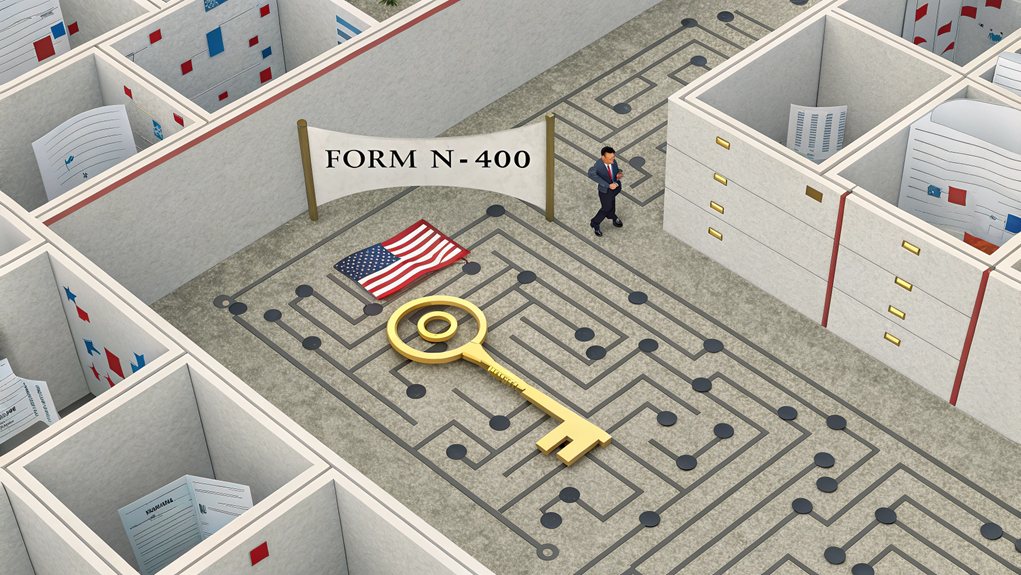The U.S. citizenship process? It's a journey filled with paperwork and procedures. First, you need to meet some requirements, like age and residency. Then, you fill out Form N-400. Don't forget to pay the fees and provide documents! Next, there's a biometrics appointment and, if you survive that, a citizenship interview. Pass the tests, and you're almost there. Finally, take the oath, kiss your Green Card goodbye, and voilà—you're a citizen! There's more to uncover about it all.

Maneuvering the U.S. citizenship process can feel like trying to decipher a Rubik's Cube blindfolded. First, you have to be at least 18. No getting around that.
Then, make sure you've been a permanent resident for five years, or three if you're married to a U.S. citizen. If you've been vacationing in and out of the country, good luck proving your continuous residence.
Be a permanent resident for five years—or three if married to a U.S. citizen. Good luck proving your residence if you love to travel!
Next up? Good moral character. What does that even mean? It's subjective, but you better hope your past is squeaky clean.
Now, let's talk knowledge. You need to pass a basic English and civics test. Yes, they really expect you to know U.S. history and government like your life depends on it. Applicants must demonstrate good moral character throughout the process to ensure eligibility for citizenship. Additionally, understanding the application process is critical to navigating the path to citizenship successfully.
Now, don't forget the paperwork. Fill out Form N-400. That's your golden ticket to the next step. You can file online or by mail, but don't forget to include documents like your Green Card and tax returns.
Oh, and that filing fee? It's not cheap. If you're lucky, you might be exempt, but don't count on it.
Once that's done, brace yourself for the biometrics appointment. This is where they collect your fingerprints. Yes, they send those off to the FBI. Fun times, right?
Bring your ID and your Green Card. You'll also get study materials for the tests.
After a few months of anxious waiting, you'll get scheduled for an interview. A USCIS officer will go through your application and grill you on English and civics. If you're lucky, you might even be exempt from the tests.
Finally, if you survive all that, there's the oath ceremony. Hand over your Green Card, and voilà! You become a citizen.
Citizenship rights? They're yours now. Enjoy the freedom.
Frequently Asked Questions
What Is the Cost of Applying for US Citizenship?
Applying for U.S. citizenship? Get ready to cough up some cash.
The application fees? A hefty $710 online, $760 if you prefer paper. There's a $50 discount for online submissions, but hey, no refunds if they reject you.
Feeling broke? You might qualify for a fee waiver based on income.
Just know, if you mess up the payment, your application could vanish into the void. Good luck!
How Long Does the Citizenship Process Typically Take?
The citizenship process can feel like watching paint dry. On average, it takes about 5.5 months, but don't get your hopes up—some folks wait over a year.
Why? Think incomplete paperwork, background checks, and the infamous USCIS backlog. Plus, processing times are all over the map depending on where you apply.
Can I Apply for Citizenship While in Removal Proceedings?
Applying for citizenship while in removal proceedings? Good luck with that. It's complicated.
Those proceedings scream "immigration issues," which usually means your citizenship application is going to face some serious delays and hurdles.
You'll need to prove you're a model citizen, which is tricky when you're fighting to stay. Plus, USCIS has its own agenda—good luck getting them to prioritize your case.
Legal counsel? Yeah, definitely a smart move here.
What Happens if My Citizenship Application Is Denied?
If a citizenship application gets denied, it's not the end of the world, though it might feel like it.
The USCIS sends a lovely rejection letter, explaining why. Maybe the forms were a mess, or they found some questionable character traits. Fun, right?
Applicants can appeal or just fix their issues and try again. Legal help might make things a bit easier.
It's all about learning from the mistakes and giving it another shot.
Are There Any Exceptions to the Residency Requirements?
Yes, there are exceptions to those pesky residency requirements.
U.S. government employees working abroad? They're off the hook. Media types promoting the U.S.? Same deal.
And let's not forget the brave souls in the armed forces—they can get a pass too.
Older applicants and those with disabilities might dodge some tests.
It's like a game of exemptions, where not everyone has to play by the same rules. Lucky them!






